
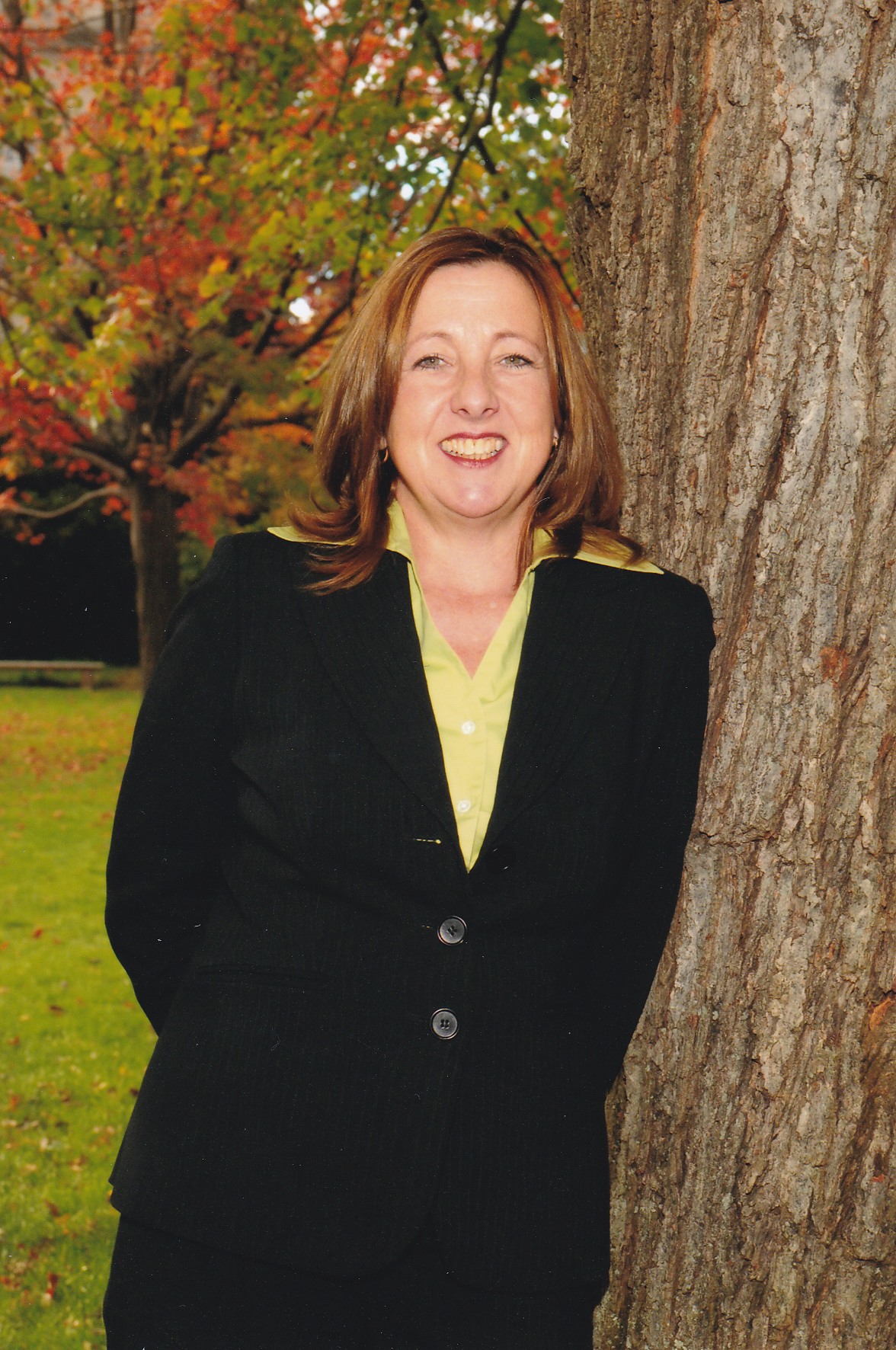 by Cheryl Eagan-Donovan
by Cheryl Eagan-Donovan
The vibe at this year’s festival can be summed up in one word: gratitude. From audiences, filmmakers, festival staff, and volunteers, everyone seemed genuinely thankful to be back in person, seeing exciting new films on the big screen, sharing the experience with other film lovers, masks optional. It was so great to see Festival Programmer Nancy Campbell back in the theaters and at the parties enjoying the success of the twentieth anniversary series of premieres, spotlights, and showcases.
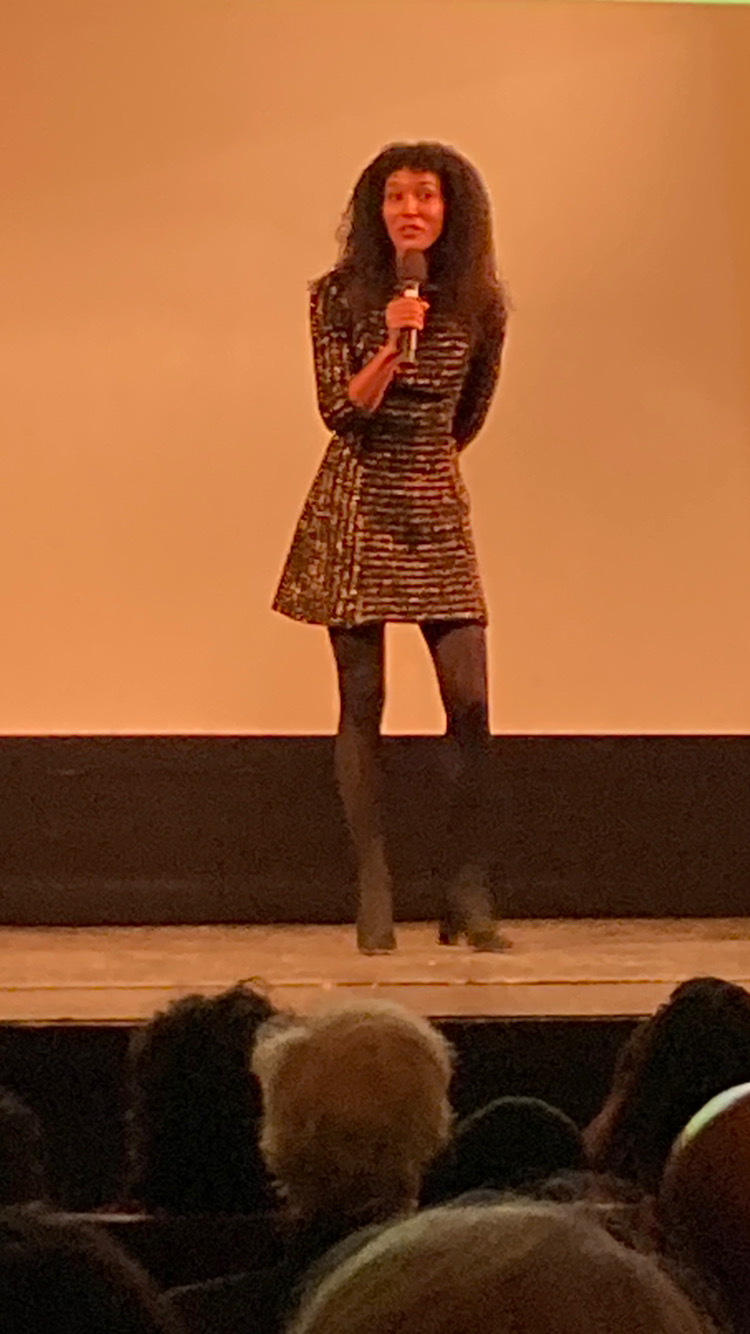
Opening night featured a near-sold-out crowd at the Somerville Theater for Brooklyn Sudano’s intimate portrait of her superstar mom, Love to Love You, Donna Summer. I loved the opening sequence featuring her breakthrough hits Love to Love You and I Feel Love, which earned her the title of Queen of Disco and Queen of Sex Rock. Those who are not familiar with her early career may not know that she began as the lead singer in a rock band, but the influence of rock and roll on her creative output is something else that sets her apart from other female artists from the time period. Like Hendrix, she was able to synthesize a variety of musical genres and styles into some explosively original material, while creating a persona that reflected the inherent sexuality of the music and the power to use that as a means of self-expression in her work. The different strands of her family, her love life, and her artistic achievements as a songwriter and composer, come together in this film to create an indelible portrait of an icon. The director doesn’t shy away from the challenges her mother faced but always keeps her accomplishments at the forefront. Unlike the Broadway musical Summer! (which I saw in New York first and then again in Boston) this film is a time capsule that captures and preserves for future generations the genius of the Boston native as a performer, a writer, and an innovator. The unflinching honesty of Brooklyn’s documentary is a fitting tribute to her mother’s bravery. The archival footage, including home movies and live performances recorded on consumer quality video cameras, lends another layer of authenticity. This is not a compilation of slick, overproduced Neil Casablanca promotional material. The viewer is transported to the concert venues to dance and sing along, and invited into her home to share her last birthday party and last Christmas with the people who truly love her. Seeing this film, it’s impossible not to love her. The film premiered on HBOMax on Sunday May 21st.
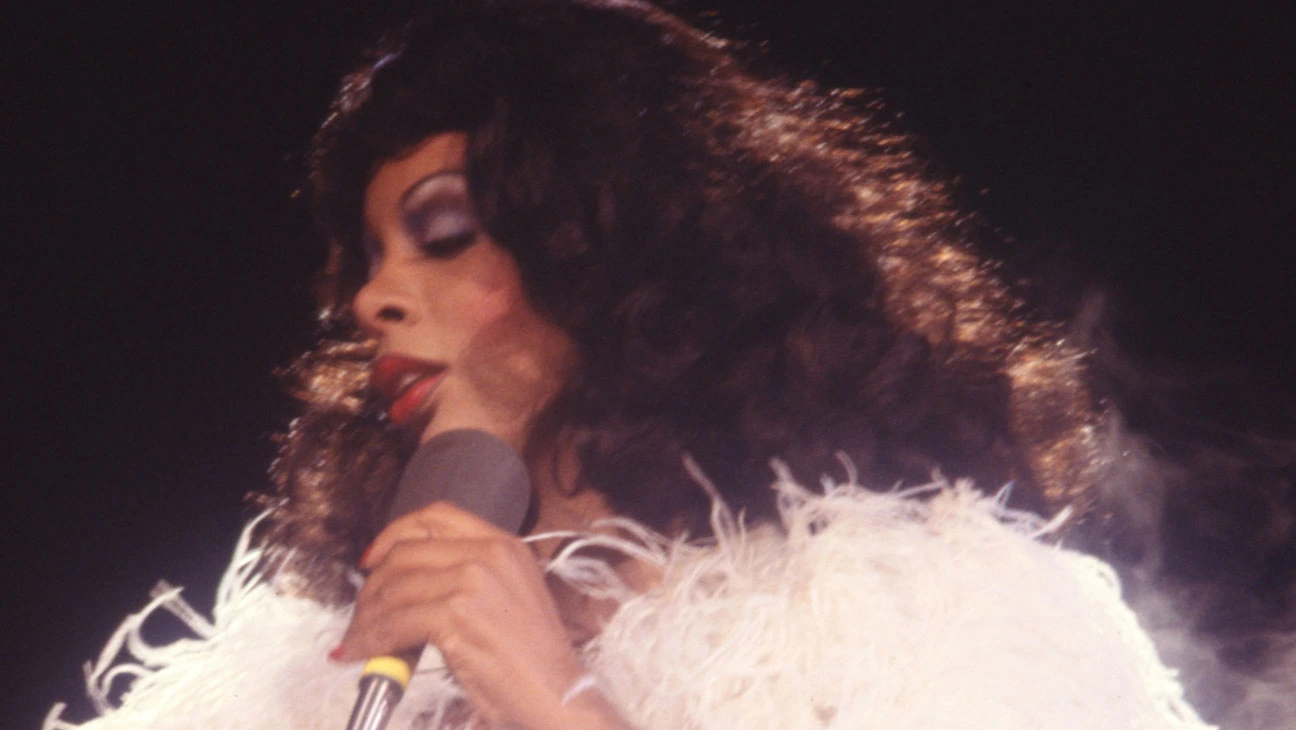
The post-screening interview hosted by local reporter Robin Young kept the audience waiting too long for the dance party that followed at Crystal Ballroom, where the music continued and many members of Summer’s family made a brief appearance. We danced until midnight. A fabulous way to kick off the festival!
On Thursday night, I returned to the Somerville Theatre to see the documentary feature Stephen Curry: Underrated. I went into the film not knowing much about the subject but I had seen director Peter Nicks’ previous film, the award-winning Homeroom, which premiered at Sundance in 2021 and follows a group of students at Oakland High School. This film is an Apple TV high-quality production that utilizes the motif of a video cassette or DVD recording to cut back and forth between two key moments in the athlete’s life. We meet Curry’s parents who instilled in him their own fierce determination to succeed, and we become intimately acquainted with the another superstar who has stayed closely connected to family and friends even after reaching several pinnacles of success. The parallel seasons of 2008 at Davidson College, where he stunned the sports world with his raw talent and led the team to the NCAA Elite Eight Tournament, and the 2021-22 playoffs with the Golden State Warriors, where sportscasters had all but written him after a series of injuries, are woven together here with expertise and a true sense of the dramatic. Boston fans know the result of the 2021-22 season, when the Warriors came from behind to best the Celtics, but the 2008 win for the Wildcats became the major turning point in Curry’s career. After that season, he made the decision to leave school and go pro. In an analogy to the title and opening of the film, which reminds the viewer that Curry was once dismissed by scouts because of his small stature, the director also follows Curry’s decision to finish his college degree at Davidson by taking online classes while playing for the Warriors. We see Curry writing his thesis at home while his young children vie for his attention, and the film ends with him receiving his diploma to fulfill the promise he made to his mother. A real Cinderella story.
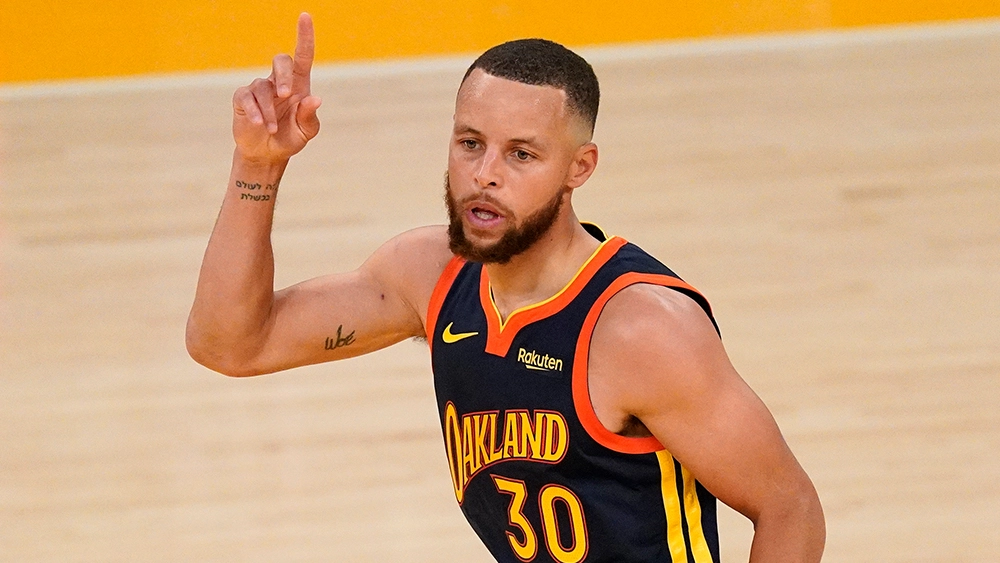
Next on my itinerary was Free Time, a charming and funny narrative set in Brooklyn, shot in just 10 days, by first-time feature director Ryan Martin Brown and starring a cast of New York-based up-and-coming actors, led by the quick-witted Colin Burgess. Burgess steals the show as Drew, a data analyst nearing his 30th birthday who decides to quit his dead-end job and live life to the fullest. All manner of mayhem ensues in a wild ride that benefits from a very clever premise that perfectly captures the post-COVID zeitgeist, the extraordinary cinematography of L.A. import Victor Ingles, and the excellent musical score by Mason Margut. Director Brown cites Albert Brooks and Eric Rhomer as influences, and this becomes clear as the film teeters between offbeat American comedy and French new wave je ne sais quoi. The cast and crew in attendance seemed genuinely shocked and overwhelmed by the positive audience response at festivals to date, and this unaffected awe at their own success just adds to their charm. Definitely a director to watch.
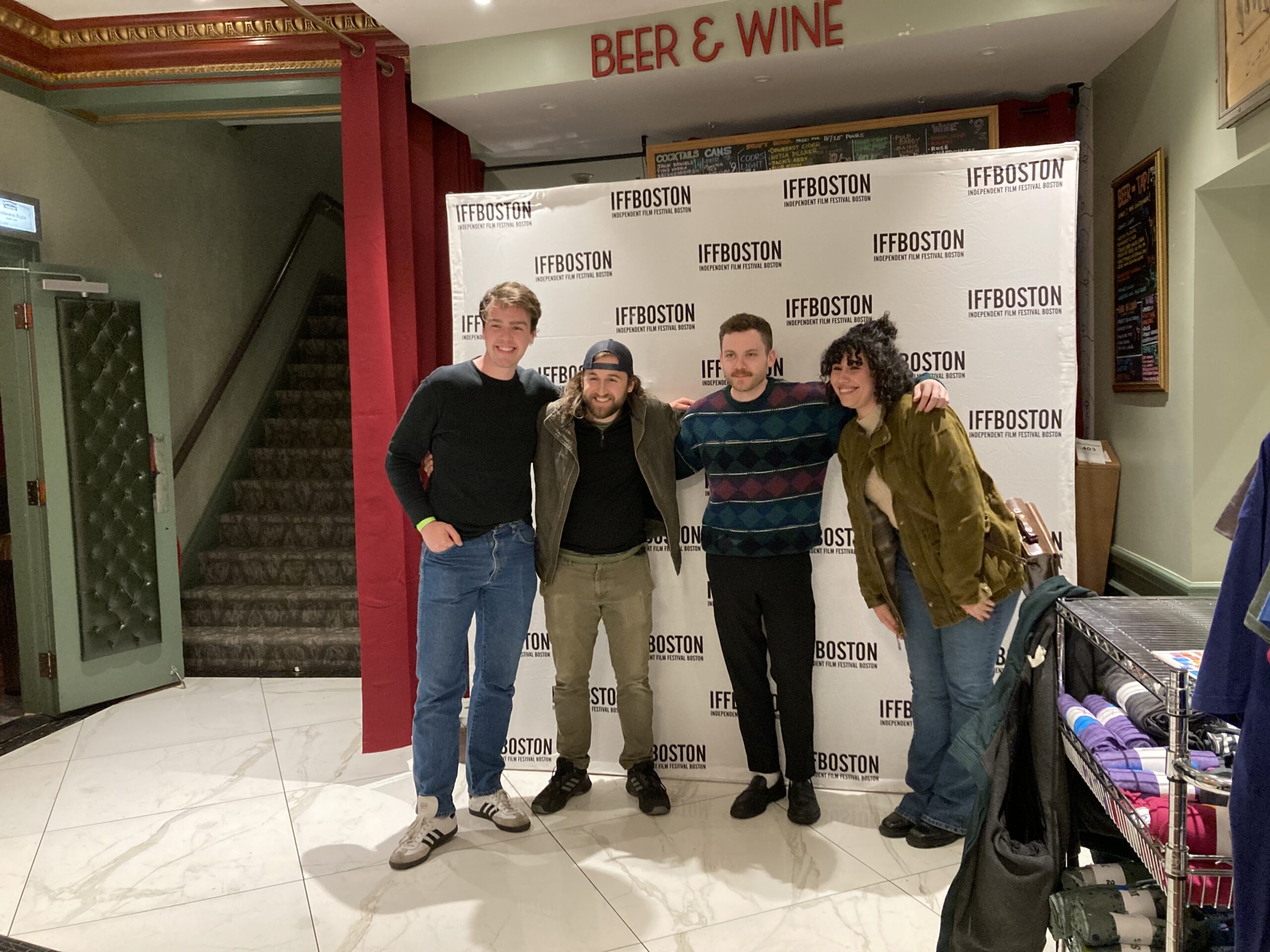
Friday night we made a quick stop at the LEF Foundation Party at the Crystal Ballroom, where I had a chance to pitch my new documentary project to founder Lyda Kuth, and then we headed to the Somerville Theatre. I chose to attend the documentary 26.2 to Life, an excellent documentary about a program at San Quentin where prisoners train and compete in an annual marathon inside the yard. Coached by retired professional runner Frank Ruona and few other volunteers, the members of the 1,000 Mile Club are a diverse group of men whose lives intersect in the process in a way that would not otherwise be possible within the strict social structure of the prison system. The star of the film Markelle “The Gazelle” Taylor, was released on parole in 2018, went on to run the New York and Boston Marathons, and appeared at the post-screening Q&A with director Christine Yoo. He has become an activist and hopes to start similar running programs at other prisons around the country. Winner of the Grand Jury Special Award for Documentary.
After dinner at Foundry on Elm, we stopped in at the Crystal Ballroom for the Friday Night Party and talked to a few of the filmmakers.
On Saturday, we went to the Brattle Theatre at noon to see the Contemporary Iranian Shorts, four films by women directors. The program, curated by Homa Saarabi, a film professor at Emerson College, and Ghazaal Bakhtazad, a filmmaker and activist, featured experiment and traditional shorts that showcased stunning cinematography and amazing ethnographic portraits of Iran and its people. Two of the longer works, Waterfolk and How Green Was Our Valley, were especially moving and evocative.
On Saturday evening Chlotrudis hosted a sponsor cocktail party at the Crystal Ballroom. We arrived early and represented while the rest of our film society colleagues were en route from Harvard Square. We hopped on the Red Line and headed back to the Brattle for the Boston premiere of The Dogmatics: A Dogumentary, directed by Rudy Childs. One of the best bands to come out of the Boston garage punk scene of the late 1970s and early 80s, the Dogmatics captured the spirit of the times in a way defies labels, fusing hardcore, rockabilly, and pop into a unique soundtrack of the city. Their loft on Thayer Street was the stuff of legend and many a great party, a hangout for other musicians, and makeshift motorcycle repair shop. The screening brought out a big crowd of fans, family, and other local band members including Carl Biancucci bass player for The Classic Ruins, who attended the entire festival and compared film notes with us. The footage features lots of live performances, including the anthem Drinking By the Pool, filmed at a graduation party poolside featuring band members as teenagers, and the scathing, tongue-in-cheek Hardcore Rules, commentary on the afternoon all ages shows that took over the Ratskellar in the 90s before the beloved venue closed. Priceless is the only word to describe twin brothers Paul and Peter O’Halloran jousting with plastic light sabers on their motorbikes in their second floor apartment in the loft. The film perfectly captures the joie de vivre of the early days of Boston punk rock, preserved by the band’s current members who continue to play live shows. It is also a bittersweet memorial to Paul O’Halloran who died suddenly in a motorcycle crash in 1986, ending an era and devastating the Boston music community. Childs explained in the Q&A that he waited until the band started playing out again to finish the film so that the ending would focus not on the death of the bass player but the determination of brothers Pete, Jimmy, and Johnny, and bandmates Jerry Lehane and Tommy Long, to keep the party going. Screening in Norwood with a live performance on Thursday May 25th. For fans of Boston rock and roll: not to be missed.
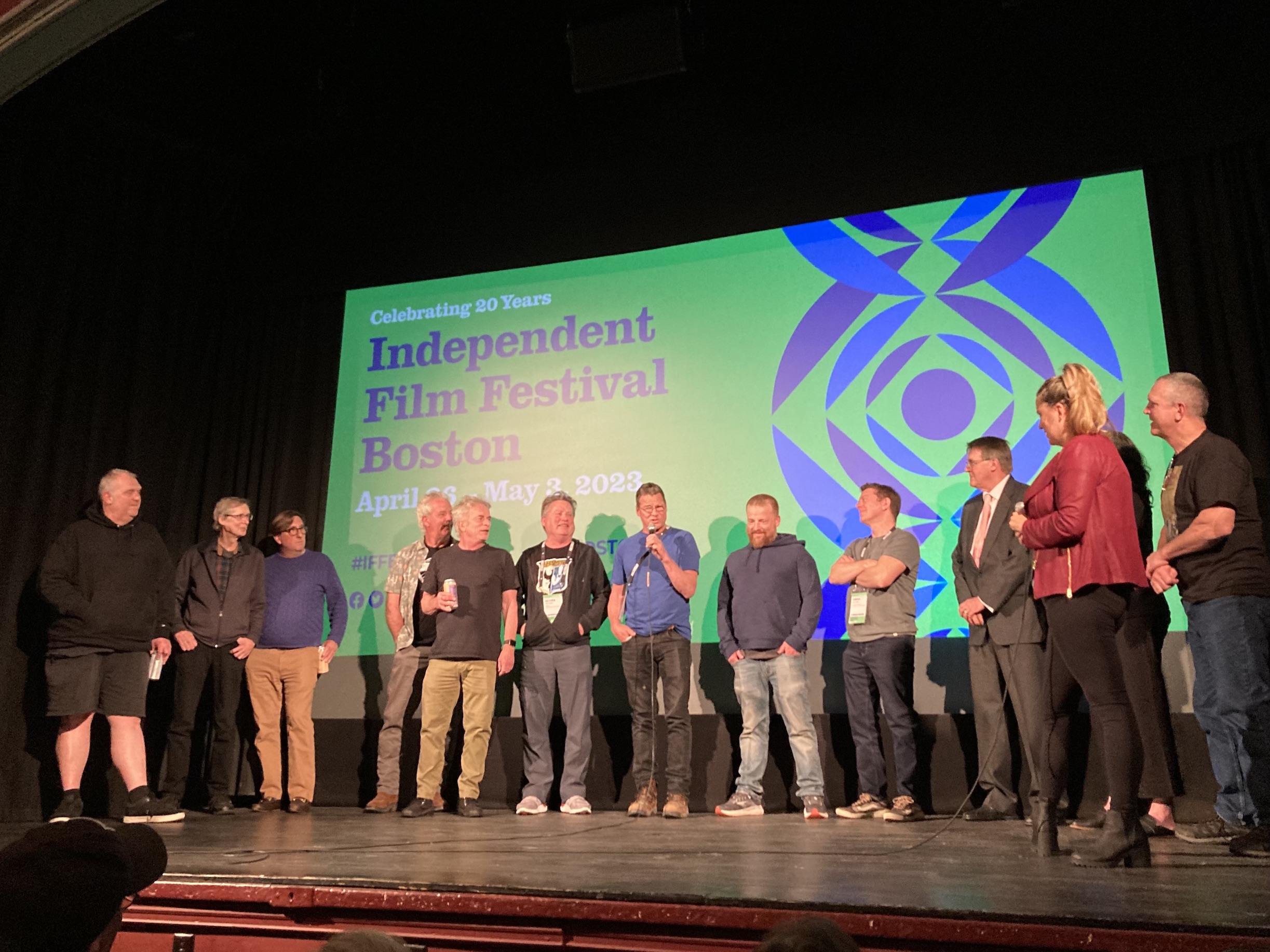
We returned to the Crystal Ballroom to catch up with Chlotrudis members Michael Colford, Vicki Oleskey, and Brett Reliford during the Mass Art video party, where we talked about upcoming festivals and shared our itineraries for the next day.
Sunday afternoon we headed back to Harvard Square for Aurora’s Sunrise at the Brattle. A beautiful film about a tragic event framed by the life of a fascinating character, this documentary uses gorgeous animation to tell he story of a woman who survived the Armenian genocide, traveled to the United States and became a celebrity as the star of a film about her experiences. Eighteen minutes of the original silent film were discovered soon after the death of the story’s protagonist, and the director cuts this footage together with interview footage of Aurora in the 1990s, along with reenactments that look like watercolor paintings, and a moving score that taken together, somehow manage to keep the horror of the reality of the mass killings from making the film unwatchable. In her last interview on screen, Aurora says that she wanted to tell her story, no matter how painful, because those responsible for the murder of so many innocent people must be held accountable. If they had, she posited, the Holocaust could not have happened. In the post screening Q&A, director Inna Sahakyan talked about the need to continue bringing awareness to the Armenian genocide and her work with the Zoryan Institute.
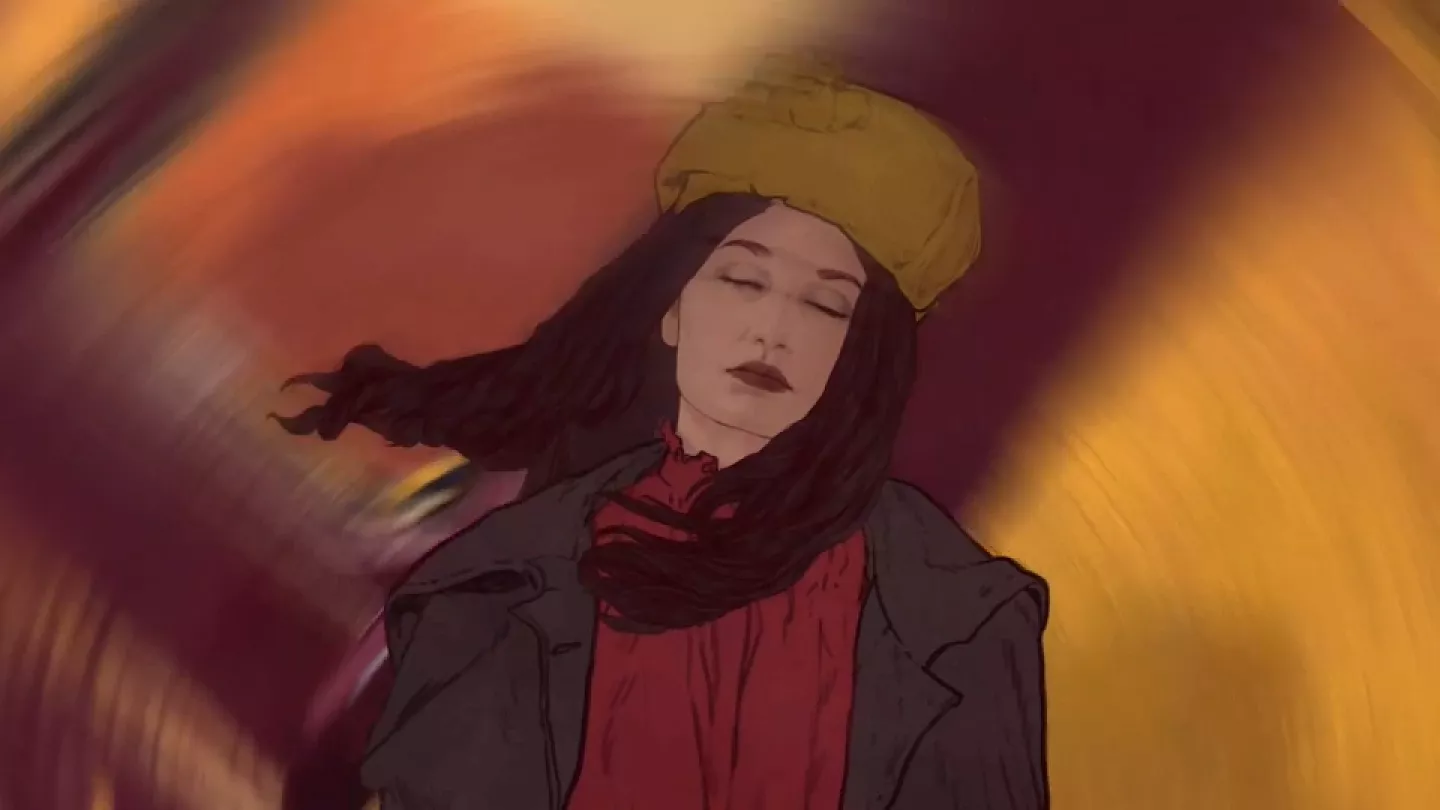
We took a break after the screening and joined Chlotrudis President Michael Colford and member/journalist Tom Meek for drinks and appetizers at Hourly Oyster House. We shared notes on the documentaries we had each seen, including Love to Love You, which Tom did not love, and Still, the Michael J. Fox bio that he appreciated more than other members of our group. That’s why it’s called film criticism.
Dinner at Source: the best wood-fired pizza in Harvard Square.
Back to the Brattle for Never Be a Punching Bag for Nobody, a festival spotlight film by musician Naomi Yang, former member of indie pop band Galaxie 500 and half of duo Damon & Naomi. Yang is also a photographer, which is what brought her to an East Boston boxing gym. The director becomes interested in owner Sal Bartolo, Jr., decides to take boxing lessons from him, and finds closure for her own family history with an abusive father in the process. Yang seemed detached from her film, even though she clearly bonded with Bartolo. She attempts to draw an analogy between her own experience and that of the residents of the neighborhood trying to fight corporate giant Logan International, but the film lingers a little too long on still shots of Boston Harbor, the airport, and the marsh for a moving picture. After the screening, she was joined by Sal and a reporter from The New Yorker, which made me think that this might have been a great feature article as opposed to a film. Nonetheless, winner of the Audience Award for Best Documentary.
Back to Somerville Theater for the documentary Beautiful Was the Fight, another disappointment. Directed by Dan Habeeb, this film lacked a narrative. The production quality of the performance footage was super slick, especially when compared to the home movies of Donna Summer or the 8mm films of the Dogmatics, but that low-res material lent authenticity to those docs, where the directors focused the lens on artists who were complex and compelling. In Beautiful, none of the featured artists stood out as innovators or musicians. The film felt like a ninety-minute advertisement for the backroom of The Burren, a Davis Square Irish bar that has hosted some excellent live music, but the director fails to deliver the promised story of the challenges women in the industry face. It was difficult to connect with any of the subjects or their music, no matter how many times they appeared on screen.
After a long, rainy day, we stopped in at the Karaoke party at the Crystal Ballroom, the highlight of the night! Festival staffers took the mic and belted out some great tunes including The Replacements’ Swinging Party and everybody’s favorite last song, Closing Time. It was so much fun to see the festival volunteers, who work so hard to make the experience great for all of us, cut loose and really enjoy the party!
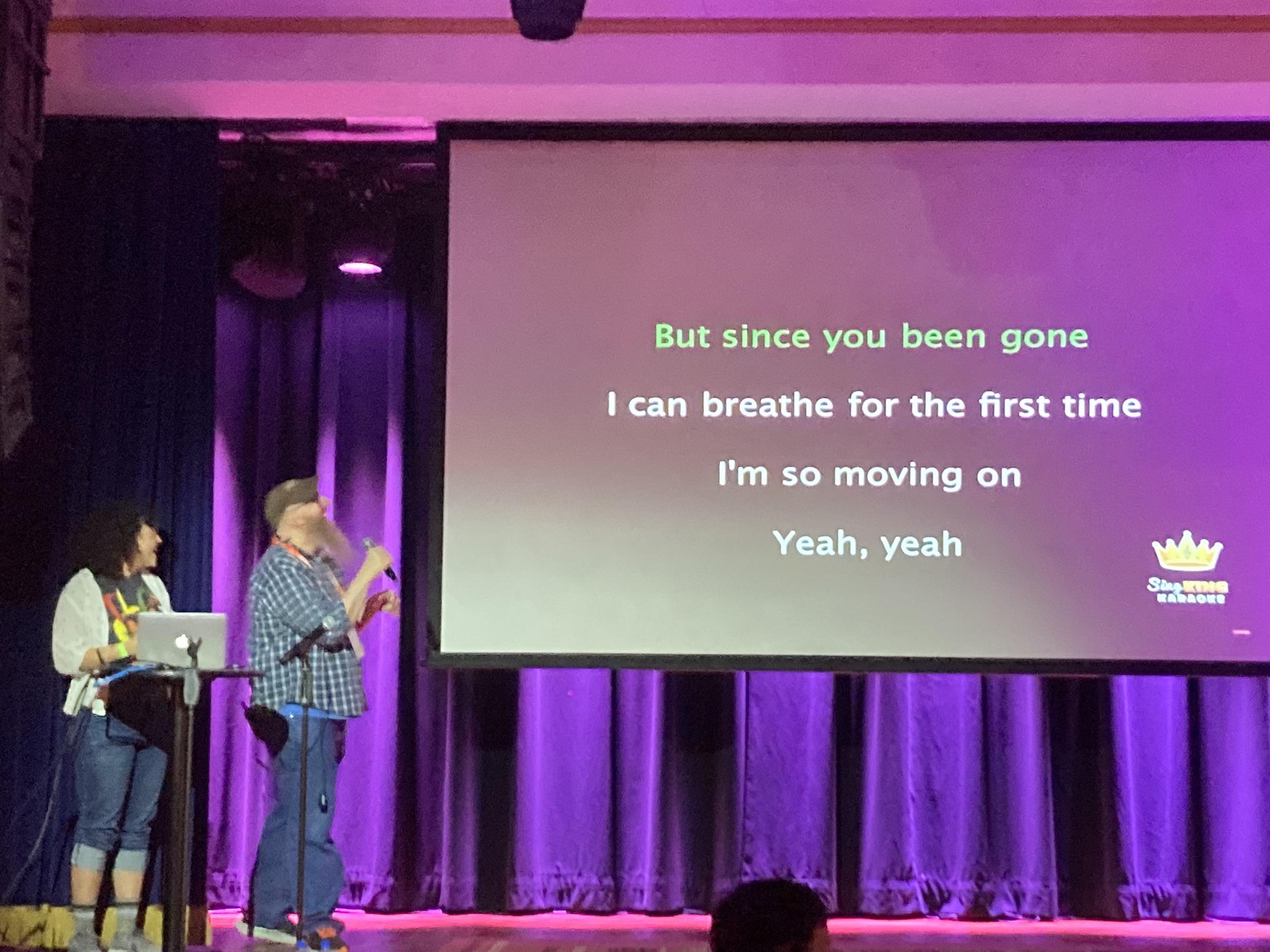
Monday night I took a break from the festival to attend a game at Fenway Park. Red Sox Win!
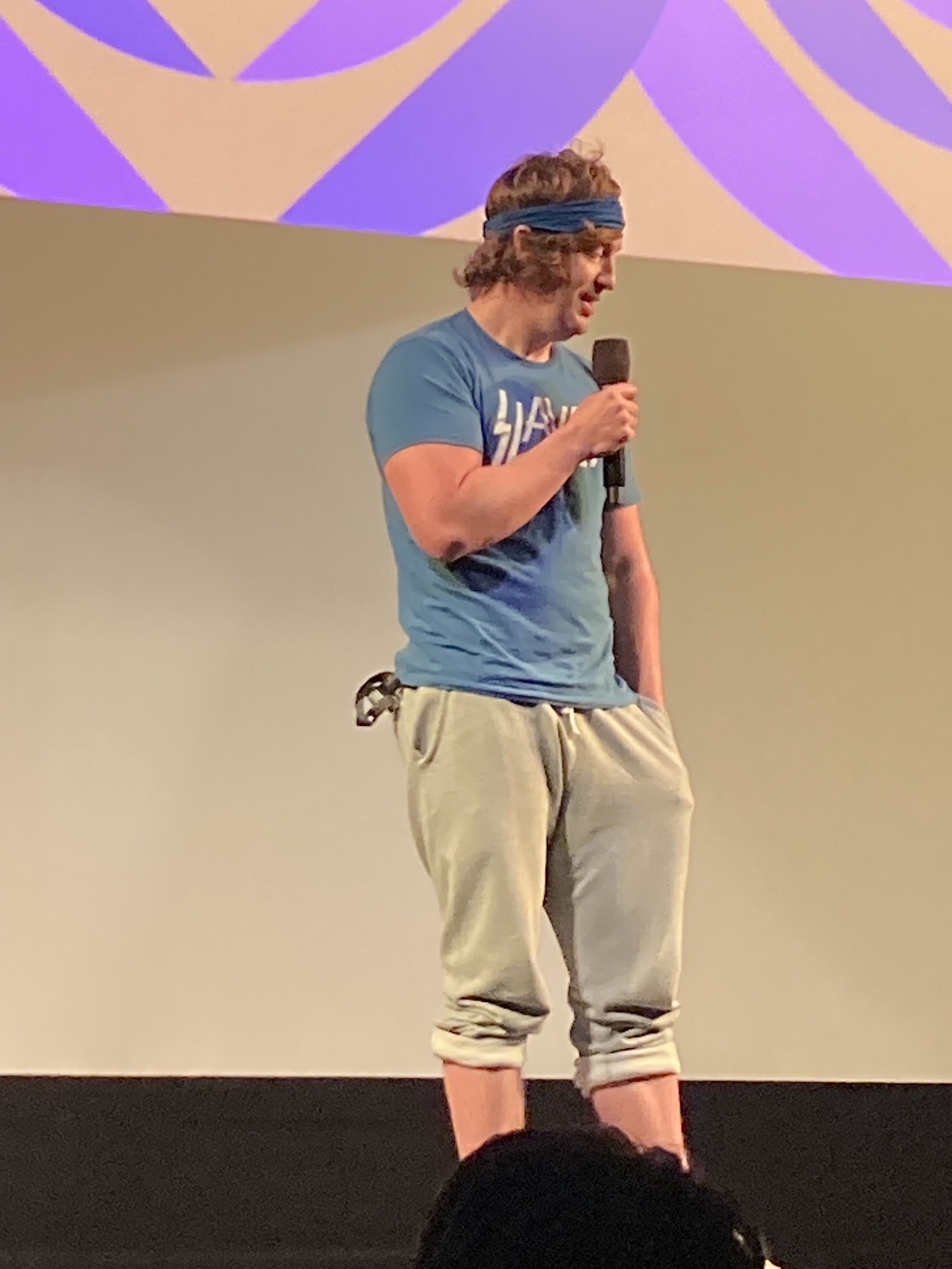
Tuesday night, another festival spotlight film: Blackberry at the Somerville Theater. Great fun! Made for just $5 million, this narrative feature is a wild ride through the late 1990s/early 2000s and the history of the precursor to the iPhone. Great soundtrack and fabulous acting, with three main characters that the director admitted were aspects of his own struggle with the idea of work: videogame culture, perfectionist, and tyrant, as it reflects his own experience as a filmmaker. He also acknowledged the obvious influences: Glengarry Glen Ross, The War Room, Network, and Wall Street. As a screenplay, it is perfectly crafted, with a dead-on midpoint turn and a truly “all is lost” moment. Director Matt Johnson was as entertaining as his film. He shared great stories about the film, including the screening in Toronto, when the film’s real life antagonist Jim Balsillie laughed throughout the entire 122 minutes, and the screening in Berlin, where the audience response convinced distributor IFC to do a theatrical release. Opened in theaters May 12th.
This night, like so many others at IFFBoston this year, was a reminder of what makes the festival experience so unique: the excitement of seeing a new film before anyone else with a live audience, and watching the directors and crew having a great time connecting with audiences and other filmmakers in person.
On Wednesday night I went to the Coolidge Corner Theatre for the Closing Night Film, Past Lives. The theater was nearly full when I arrived and the start of the film was delayed as the staff tried to seat the late arrivals and the rush line. I was lucky to get a seat in the back of the theater behind composer John Kusiak, who was a generous mentor to me when I made my first documentary about music. Brian Tamm thanked the sponsors and festival partners including Chlotrudis, and then screened the short video montage of 20th anniversary festival moments. After announcing the Audience Awards, he thanked festival founders Scott Moomaw, Jason Redmond and Adam Roffman, as well as current festival programmer Nancy Campbell, and told the audience, “If you are open to it, this festival can change your life, because it changed mine”. He credited Lisa Richie at A24 for recommending the closing night film by Celine Song, whose 2019 stage play Endlings premiered here at the American Repertory Theatre. Song started by acknowledging the WGA writers strike, and said of her transition from playwright to first-time feature film director “it was fate’; she felt that she was “always meant to be doing it”.
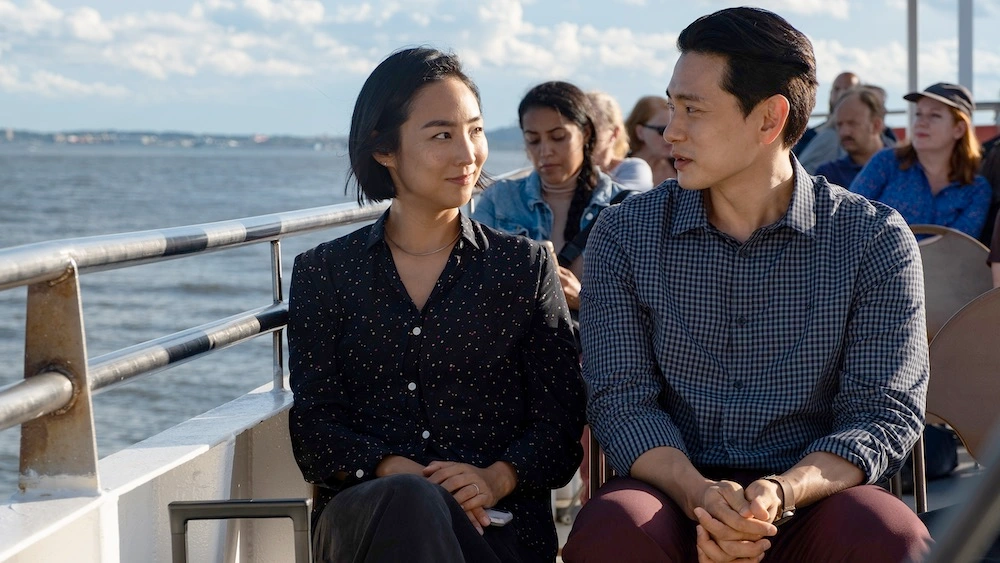
The film references many other great romantic movies, from Umbrellas of Cherbourg to Happy Together and Lost in Translation. The scene in Korea where the two young friends climb the stairs on their way home after school evokes the Parisian neighborhoods of The Red Balloon. The director talked about the challenges of filming during the pandemic, cutting between scenes being shot in two separate rooms like a DJ to create the illusion of the pair’s relationship in a remote online reunion once the main character Nora leaves Korea for New York. The film’s cinematography is as beautiful as the relationship between the two main characters is frustrating. Song described the structure of the film as three goodbyes, two bad and one good, and talked about the idea of fate as the theme of the film. Nora’s decision to leave Korea and leave her old self behind, while devastating to her childhood first love, enabled her to build a new life for herself in New York as a successful writer. Hae Sung cannot forget her and twelve years later, he tracks her down, but their brief reconnection over Skype is cut short when Nora announces that she needs to take a break, and goes to a writers’ retreat on Long Island where she meets the author she will marry. Another twelve years pass, and Hae Sung travels to New York to see Nora, where they have their last, proper goodbye. The film upends our expectations in that the romantics in the audience like me will empathize with the jilted lover, and hope along with him for a last minute change of heart and happy ending, but it is not to be. Song’s explanation of the way in which she chose to depict the protagonist’s ability to be loved by two different men in two very different ways reminded me a bit of Jules and Jim, but her conclusion was the that film was ultimately about Nora grieving for the little girl she left behind in Korea. A triumphant first feature; another director to watch.
The closing night party at Parlour on Harvard Avenue was great fun – celebrating the end of another successful festival with staff, fellow rock doc filmmakers Eric Green and Rudy Childs, and Chlotrudis member Julie Blumenthal who was also celebrating her birthday.

One week earlier the community had gathered at the Coolidge to celebrate the life and work of filmmaker Lucia Small. Her last film Girl Talk, premiered at IFFBoston last year to a sold out crowd. It was the last time I saw her. I also saw her first film, My Father the Genius, at IFFBoston. Lucia was an amazing person, friend and mentor to so many filmmakers, a formidable presence whose presence was as powerful on that chilly Saturday as it was during her brilliant but far too short lifetime. All of the tributes from friends, family, and collaborators were emotional and heartfelt, passionate and inspiring, but one moment stood out for me. Her father, famed architect Glen Small, the subject of her 2002 Chlotrudis award-winning film, spoke to the capacity crowd at the theater. Nothing is more difficult for a parent than losing a child, but he braved the stage to share an intimate moment in their relationship. He sang a few lines from some of their favorite Broadway show tunes that they used sing together when she was young: “Oh What a Beautiful Morning” from Oklahoma! and “Some Enchanted Evening” from South Pacific. He said the hospice nurses told him she sang that song to them every night. It was a beautiful memory of an extraordinary person who touched so many lives, and an apt analogy for the magic of filmmaking to bring people from diverse backgrounds together to experience power of moving images and light. It creates a collective synergy that can’t be simulated online and carries with it the healing power of art and music. Thanks to my colleagues at Chlotrudis and everyone at IFFBoston for making this a year to remember.
Festival photos courtesy of Cheryl Eagan Donovan
